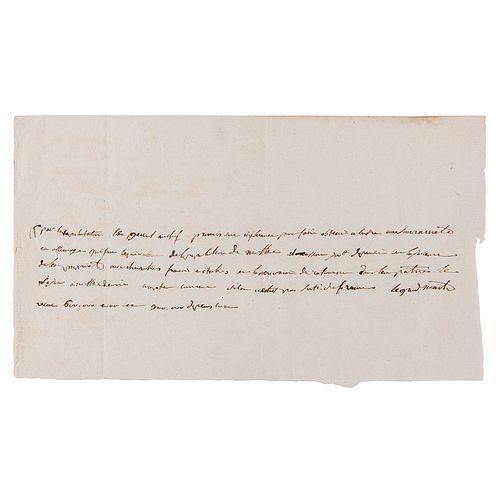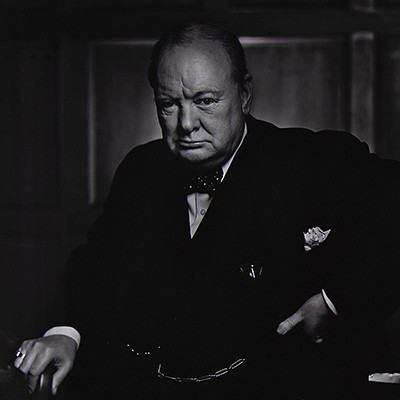Napoleon Handwritten Manuscript on the Capture of Malta, Prepared for His Memoirs
Two ways to bid:
- Leave a max absentee bid and the platform will bid on your behalf up to your maximum bid during the live auction.
- Bid live during the auction and your bids will be submitted real-time to the auctioneer.
Bid Increments
| Price | Bid Increment |
|---|---|
| $0 | $5 |
| $50 | $10 |
| $200 | $25 |
| $500 | $50 |
About Auction
Feb 22, 2024
RR Auction's first-ever February installment of its Remarkable Rarities series brings some 50+ pieces of history to the auction block, representing the most elusive and extraordinary items offered all year. RR Auction support@rrauction.com
- Lot Description
Unsigned handwritten manuscript by Napoleon Bonaparte, one page, 8 x 4.5, no date. Important handwritten manuscript by Napoleon Bonaparte regarding his proposed memoirs, ostensibly penned while living in exile at Longwood House on Saint Helena. Napoleon famously dictated his memoirs to his aides, Charles Tristan, marquis de Montholon, and Emmanuel, comte de Las Cases, who had accompanied him to Saint Helena. Las Cases published the admiring work under the title Le Mémorial de Sainte-Hélène (The Memorial of Saint Helena) in 1823. Here, Napoleon writes out some commentary on the capture of Malta.
In full (translated): "By the capitulation, the commander-in-chief promised his influence to obtain for the Order sovereignty in Germany equivalent to the population of Malta and ensured 700 francs of pension and the enjoyment of their property for French and Italian knights, and permission to return to their homeland. The stay in Malta was to count as if one had not left France. The Grand Master received 600,000 in gold and 300,000 in pension." In fine condition.
The capture of Malta had been contemplated by Bonaparte since the conquest of the Ionian Islands in July 1797, and he had sent Poussielgue in November of the same year to gather information on defenses and gain supporters among the numerous French knights. It turned out that the military strength of the Order was weak, but the fortifications of the island were imposing. This project was executed during the prologue of the Egyptian expedition: the French fleet left Toulon on May 19, 1798, and Bonaparte landed on the island on June 10. At the request of the Order of Malta, he sent his aide-de-camp Junot to negotiate a ceasefire, which was signed on June 11 at 2 a.m. He then established a convention (capitulation) signed on June 12 aboard the French flagship by the Grand Master of the Order, Ferdinand von Hompesch: this text stipulated that the Order ceded to France all its sovereignty rights over Malta and its dependencies and settled the fate of the Grand Master and the knights.
Aware of the major role he had played in the history of his time, Napoleon Bonaparte devoted long hours at Saint Helena to dictate—and more rarely write—an account of his campaigns and military and political analyses of his era. Napoleon had little else to do than to reflect on his triumphs, and this piece documents some of Napoleon's own thoughts on his early military successes. It is a critical manuscript that offers insight into Napoleon's understanding of his life and career. - Shipping Info
-
Bidder is liable for shipping and handling and providing accurate information as to shipping or delivery locations and arranging for such. RR Auction is unable to combine purchases from other auctions or affiliates into one package for shipping purposes. Lots won will be shipped in a commercially reasonable time after payment in good funds for the merchandise and the shipping fees are received or credit extended, except when third-party shipment occurs. Bidder agrees that service and handling charges related to shipping items which are not pre-paid may be charged to a credit card on file with RR Auction. Successful international Bidders shall provide written shipping instructions, including specified Customs declarations, to RR Auction for any lots to be delivered outside of the United States. NOTE: Declaration value shall be the item’(s) hammer price and RR Auction shall use the correct harmonized code for the lot. Domestic Bidders on lots designated for third-party shipment must designate the common carrier, accept risk of loss, and prepay shipping costs.
-
- Buyer's Premium



 EUR
EUR CAD
CAD AUD
AUD GBP
GBP MXN
MXN HKD
HKD CNY
CNY MYR
MYR SEK
SEK SGD
SGD CHF
CHF THB
THB



